Carl Perkins (1932-1998)
Carl Perkins (1932-1998) was an American singer-songwriter who recorded most notably at the Sun Studio, in Memphis, Tennessee, beginning in 1954.
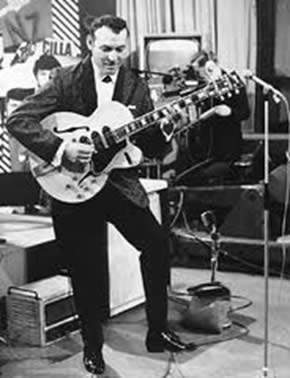 His best-known song is “Blue Suede Shoes”. According to Charlie Daniels, “Carl Perkins’ songs personified the rockabilly era, and Carl Perkins’ sound personifies the rockabilly sound more so than anybody involved in it, because he never changed.”
His best-known song is “Blue Suede Shoes”. According to Charlie Daniels, “Carl Perkins’ songs personified the rockabilly era, and Carl Perkins’ sound personifies the rockabilly sound more so than anybody involved in it, because he never changed.”
Perkins’ songs were recorded by artists (and friends) as influential as Elvis Presley, the Beatles, Jimi Hendrix, and Johnny Cash, which further established his place in the history of popular music. Paul McCartney claimed that “if there were no Carl Perkins, there would be no Beatles.”
Called “the King of Rockabilly”, he was inducted into the Rock and Roll Hall of Fame, the Rockabilly Hall of Fame, the Memphis Music Hall of Fame, and the Nashville Songwriters Hall of Fame. He also received a Grammy Hall of Fame Award.
Eddie Cochran (1938-1960)
Eddie Cochran (1938-1960) was an American musician. Cochran’s rockabilly songs, such as “Twenty Flight Rock”, “Summertime Blues”, “C’mon Everybody”, and “Somethin’ Else”, captured teenage frustration and desire in the mid-1950s and early 1960s.
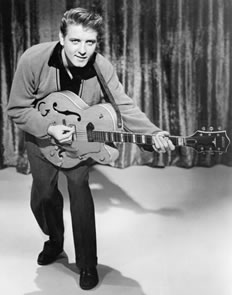 He experimented with multitrack recording, distortion techniques and overdubbing even on his earliest singles. He played the guitar, piano, bass and drums. His image as a sharply dressed and good-looking young man with a rebellious attitude epitomized the stance of the 1950s rocker, and in death, he achieved an iconic status.
He experimented with multitrack recording, distortion techniques and overdubbing even on his earliest singles. He played the guitar, piano, bass and drums. His image as a sharply dressed and good-looking young man with a rebellious attitude epitomized the stance of the 1950s rocker, and in death, he achieved an iconic status.
Cochran was involved with music from an early age, playing in the school band and teaching himself to play blues guitar. In 1954, he formed a duet with the guitarist Hank Cochran (no relation), and when they split the following year, Eddie began a songwriting career with Jerry Capehart. His first success came when he performed the song “Twenty Flight Rock” in the film The Girl Can’t Help It, starring Jayne Mansfield. Soon afterward, he signed a recording contract with Liberty Records.
Cochran died at age 21 after a road accident, while traveling in a taxi in Chippenham, Wiltshire, during his British tour in April 1960, having just performed at Bristol’s Hippodrome theater. Though his best-known songs were released during his lifetime, more of his songs were released posthumously. In 1987 Cochran was inducted into the Rock and Roll Hall of Fame. His songs have been covered by a wide variety of recording artists (see the “Style and Influence” section of this article for examples).
Bruce Springsteen (1949- )
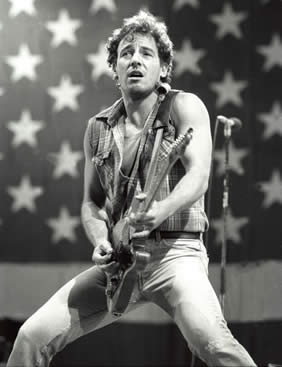 Bruce Springsteen (1949- ) is an American singer-songwriter.
Bruce Springsteen (1949- ) is an American singer-songwriter.
He is best known for his work with the E Street Band. Nicknamed “The Boss”, Springsteen is widely known for his brand of poetic lyrics, Americana, working class and sometimes political sentiments centered on his native New Jersey, his distinctive voice, and his lengthy and energetic stage performances—with concerts from the 1970s to the present decade running at up to four hours in length.
Steve Cropper (1941- )
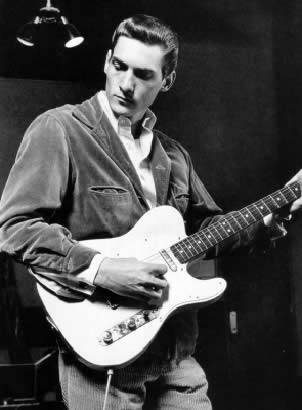 Steve Cropper (1941- ) an American guitarist, songwriter, and record producer.
Steve Cropper (1941- ) an American guitarist, songwriter, and record producer.
He is best known as the guitarist of the Stax Records house band, Booker T. & the M.G.’s, which backed artists such as Otis Redding, Sam & Dave, Carla Thomas, Rufus Thomas and Johnnie Taylor.
He also acted as the producer of many of these records. He was later a member of the Blues Brothers band. Rolling Stone magazine ranked him 39th on its list of the 100 greatest guitarists of all time
Roger McGuinn
Roger McGuinn is an American musician.
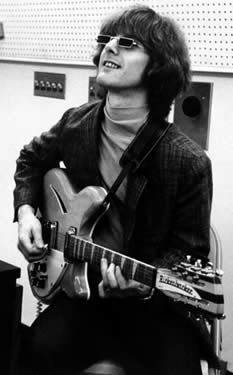 He is best known for being the lead singer and lead guitarist on many of the Byrds’ records.
He is best known for being the lead singer and lead guitarist on many of the Byrds’ records.
He is a member of the Rock and Roll Hall of Fame for his work with the Byrds.
He was also part of an author/musician band “Rock Bottom Remainders”, a group of published writers doubling as musicians to raise proceeds for literacy charities. In July 2013, McGuinn co-authored an interactive ebook, Hard Listening, with the rest of the group.
Neil Young (1945- )
Neil Young (1945- ) is a Canadian singer-songwriter, musician, producer, director and screenwriter. Young began performing in a group covering Shadows instrumentals in Canada in 1960. In 1966, after a brief stint with the Rick James-fronted Mynah Birds, he moved to Los Angeles, where he formed Buffalo Springfield with Stephen Stills, Richie Furay and others. Young had released two albums by the time he joined Crosby, Stills & Nash in 1969. From his early solo albums and those with his backing band Crazy Horse, Young has recorded a steady stream of studio and live albums, sometimes warring with his recording company along the way.
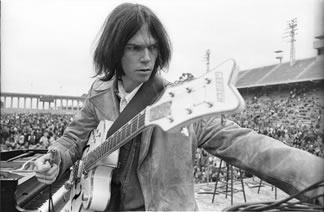
Young’s often-distorted electric guitar work, deeply personal lyrics and signature tenor singing voice transcend his long career. Young also plays piano and harmonica on many albums which frequently combine folk, rock, blues and other musical styles. Famed for emotional outbursts and ripping up live set lists, Young often plays acoustic versions of songs in one show and electric versions in others. His gritty guitar work, especially with Crazy Horse, earned him the nickname “Godfather of Grunge” and led to his 1995 album Mirror Ball with Pearl Jam. More recently Young has been backed by Promise of the Real.
Young directed (or co-directed) films using the pseudonym Bernard Shakey, including Journey Through the Past (1973), Rust Never Sleeps (1979), Human Highway (1982), Greendale (2003), and CSNY/Déjà Vu (2008). He also contributed to the soundtracks of the films Philadelphia (1993) and Dead Man (1995).
Young has received several Grammy and Juno awards. The Rock & Roll Hall of Fame inducted him twice: as a solo artist in 1995 and in 1997 as a member of Buffalo Springfield. In 2000, Rolling Stone named Young the 34th greatest rock ‘n roll artist.
He has lived in California since the 1960s but retains Canadian citizenship. He was awarded the Order of Manitoba on July 14, 2006, and was made an Officer of the Order of Canada on December 30, 2009.
Scotty Moore (1931-2016)
Scotty Moore (1931-2016) was an American guitarist and recording engineer. He is best known for his backing of Elvis Presley in the first part of his career, between 1954 and the beginning of Elvis’s Hollywood years.
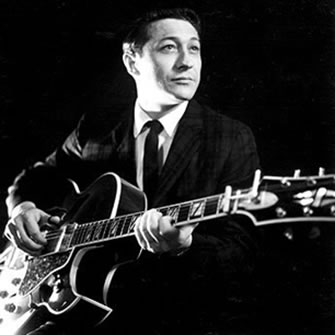 Rock critic Dave Marsh credits Moore with the invention of power chording, on the 1957 Presley song “Jailhouse Rock”, the intro of which Moore and drummer D.J. Fontana, according to the latter, “copped from a ’40s swing version of ‘The Anvil Chorus’.”
Rock critic Dave Marsh credits Moore with the invention of power chording, on the 1957 Presley song “Jailhouse Rock”, the intro of which Moore and drummer D.J. Fontana, according to the latter, “copped from a ’40s swing version of ‘The Anvil Chorus’.”
Moore was ranked 29th in Rolling Stone magazine’s list of 100 Greatest Guitarists of All Time in 2011. He was inducted into the Rock and Roll Hall of Fame in 2000 and the Memphis Music Hall of Fame in 2015.
The Rolling Stones’ lead guitarist Keith Richards has said of Moore, “When I heard “Heartbreak Hotel”, I knew what I wanted to do in life. It was as plain as day. All I wanted to do in the world was to be able to play and sound like that. Everyone else wanted to be Elvis, I wanted to be Scotty.”
James Burton (1940- )
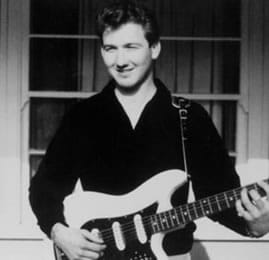 James Burton (1940- ) is an American guitarist.
James Burton (1940- ) is an American guitarist.
A member of the Rock and Roll Hall of Fame since 2001 (his induction speech was given by longtime fan Keith Richards), Burton has also been recognized by the Rockabilly Hall of Fame and the Musicians Hall of Fame and Museum.
Critic Mark Demming writes that “Burton has a well-deserved reputation as one of the finest guitar pickers in either country or rock …
Burton is one of the best guitar players to ever touch a fretboard.” James Burton is also known as the “Master of the Telecaster.”
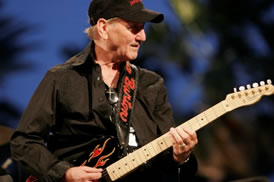 Since the 1950s, Burton has recorded and performed with an array of notable singers, including Bob Luman, Dale Hawkins, Ricky Nelson, Elvis Presley (and leader of Presley’s TCB Band), The Everly Brothers, Johnny Cash, Merle Haggard, Glen Campbell, John Denver, Gram Parsons, Emmylou Harris, Judy Collins, Jerry Lee Lewis, Claude King, Elvis Costello, Joe Osborn, Roy Orbison, Joni Mitchell, Townes Van Zandt, Steve Young, Vince Gill, Suzi Quatro and Allen “Puddler” Harris.
Since the 1950s, Burton has recorded and performed with an array of notable singers, including Bob Luman, Dale Hawkins, Ricky Nelson, Elvis Presley (and leader of Presley’s TCB Band), The Everly Brothers, Johnny Cash, Merle Haggard, Glen Campbell, John Denver, Gram Parsons, Emmylou Harris, Judy Collins, Jerry Lee Lewis, Claude King, Elvis Costello, Joe Osborn, Roy Orbison, Joni Mitchell, Townes Van Zandt, Steve Young, Vince Gill, Suzi Quatro and Allen “Puddler” Harris.
